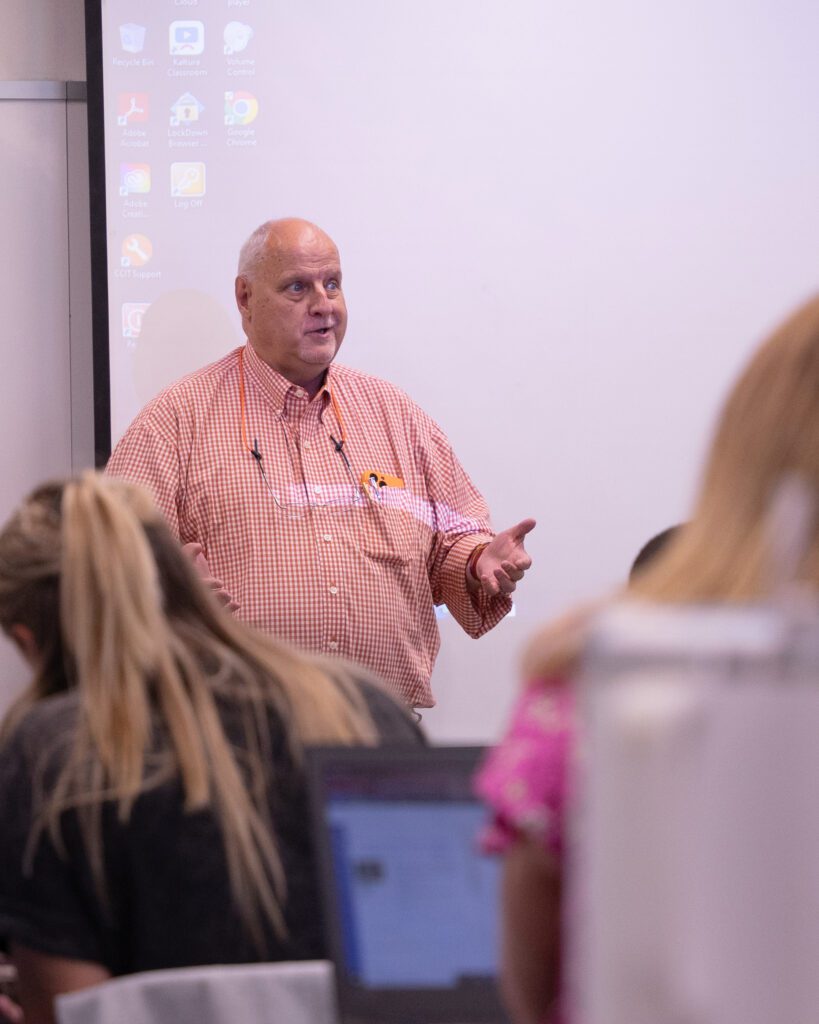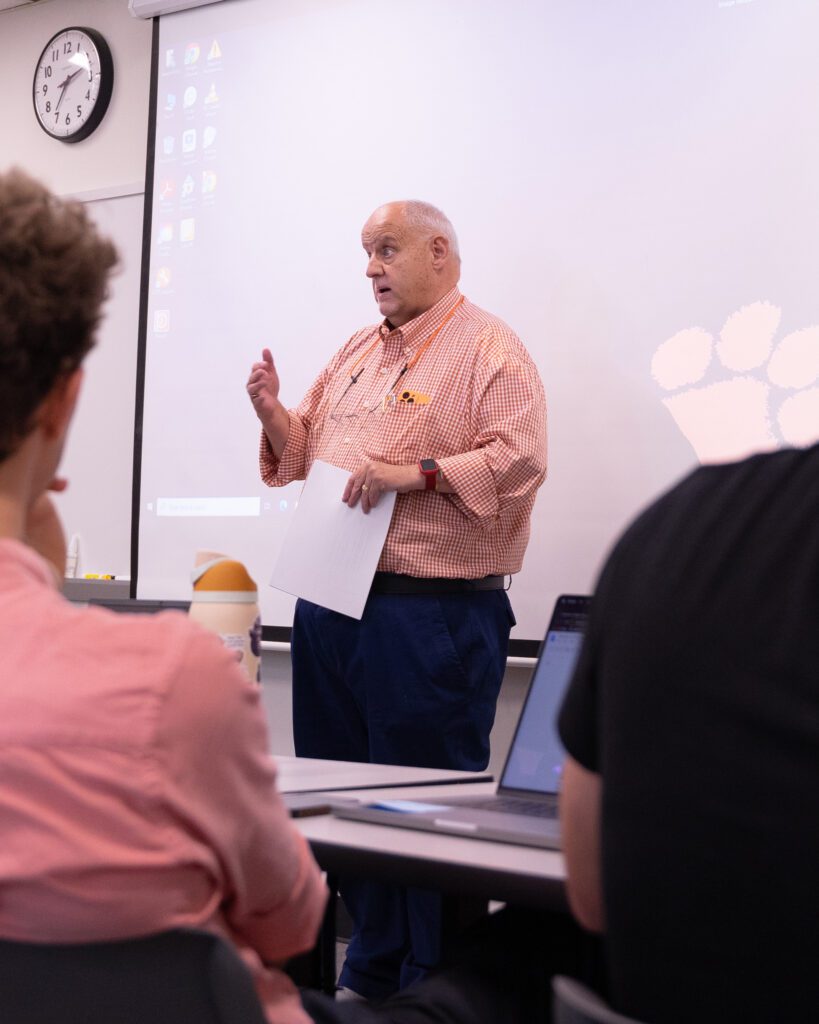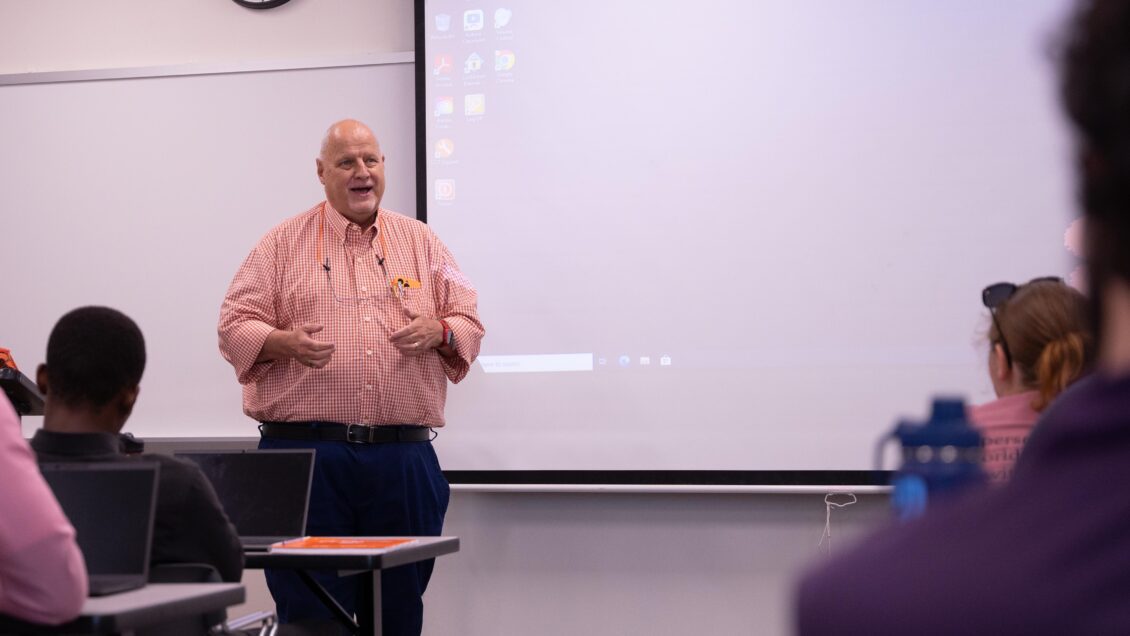Tony Cawthon is a professor of student affairs and higher education in the College of Education’s Department of Educational and Organizational Leadership Development. To say he is a fixture in the College of Education would be an understatement: Cawthon has been a faculty member in the College since 1997 and has been employed at Clemson serving students since 1991.
Cawthon spends as much time supporting and celebrating the accomplishments of others as he does looking for the spotlight, as he has chaired more than 30 dissertation committees during his time at the College. We caught up with Tony to discuss his career at Clemson University, how he knew he was an educator and how he is a sucker for a schmaltzy movie on a certain cable network.
What is your teaching philosophy?

I laugh when I think about my teaching philosophy now compared to when I started formally teaching over 28 years ago. I have learned so much and approach teaching so differently. When I started, I focused on ensuring students learned by focusing on content mastery via lectures and notes. About four years into my faculty role, I realized that was not honoring who I was nor was it helping my students.
My teaching philosophy now is grounded in student centered teaching, meaning I see my role is to create and facilitate a community of learners where we all learn from one another, myself included. As my students are master’s and doctoral students, they possess skills, experiences and knowledge that are pertinent to the classroom. I hope to empower students to use that knowledge and realize we both have the power to learn.
I strongly believe students are responsible for their own learning, and my job is to facilitate environments where that learning can occur. Utilizing my knowledge, current research and previous feedback from student evaluations, I try to employ a variety of instructional approaches that allow students to learn in whatever manner they learn.
Thus, in my classes I utilize in-class discussions, small group activities, case studies and group presentations to create opportunities for students to practice concepts and skills. This allows me to both challenge and support them as they learn. I expect them to generate and share new knowledge with peers in our community of learning. Doing so allows them to make meaning of concepts and practices.
It is my hope that I create anenvironment where free discussion, inquiry and expression are all encouraged and a classroom that is collaborative and a shared learning experience.
Why do you love teaching?
I love watching students make connections, see the light bulb go off and get excited when they “get it.” For me, teaching was a calling. It feeds my soul and allows me to help students find their voice and go change the communities in which they live and work.
When did you know that the field of education was for you?
I knew from elementary school I would do some form of teaching. I always played school as a kid and while others wanted to be the principal or coach, I always wanted to be the “teacher.” Even as a kid, I loved to create opportunities for learning and growing. I have been fortunate to do it both formally and informally. My career began working 13 years in university housing where I was the director of residence life, but I always approached that job from an educator role. Now, as a faculty member, I get to continue that role.

Name an educator that inspired you to teach.
I grew up in a small town and went to a small school system my entire life, but I had so many good teachers, so this is a hard one to answer. However, two stand out: my Spanish teacher, Nancy Hall, and my history teacher, Fred Culp. I never saw a day where they did not love what they were doing. They were teaching us content but also teaching us to be good adults and citizens. Their love for teaching was infectious, and I knew in high school I wanted to do what they did.
Describe an effective approach you use in the classroom.
One assignment I do in class that I love is having students in my introductory class in the Fall write and then film their student affairs philosophy. They then rewrite and refilm this philosophy four semesters later when graduating. I love how they take their master’s school experiences and share this philosophy.
What is the most rewarding aspect of teaching for you?
For me, this is easy — it is the mentoring I get to do. In 28 years of teaching, I have taught over 900 master’s students. I have loved every one of them — they inspired me. I was honored to become a mentor to many of them. There is no greater feeling than developing that mentor relationship. I am proud to say that many of those mentees went on to become my friends and chosen family.
What tips do you have for students in the College of Education that are preparing to be educators?
I would say don’t get me started, but here’s a bulleted list of all the things my students would tell you I am always reminding them of:
- Your jobs will be hard, complex, frustrating and rewarding, but each of you need to decide “what hill you are willing to die on.” Everything cannot be a battle so figure out what really is important to advocate for.
- Remember that every voice matters. Student affairs educators must be the role models that walk the talk related to diversity, equity and inclusion. We all will approach that role differently, but they must embrace being an advocate for things that might have negative consequences.
- College is something you complete — life is something you experience. Do not worry about your GPA or the results of success. Success is defined in numerous ways, and you will find it. When you do, no grade will be assigned — it will be defined by your own sense of accomplishment and pride.
- Happiness and success are two different things. I challenge you to ask yourself two important questions: what will make me happy and what will make me successful? The only person who can make you happy is you. The root of your happiness comes from your relationship with yourself.
- Realize that life is not fair, but it is still good! Do not be that person who keeps score! Someone will always have more than you. Focus on you and what you can do to enhance your family, community and the students you work with. When you meet others, think about how you can help them without expecting something in return.
What do you like about the Clemson University?

Clemson has been good to me, as it has provided me with so many opportunities, personally and professionally. I became the “SC parent” of many students, many of which came from out of state. We have the best students who want to learn and make a difference in the communities in which they live and work. We also have the best faculty and staff. It is a collaborative group of people that like one another personally and professionally.
Is there any subject that you’re interested in or devote time to that might surprise people?
That is a hard one. I am very transparent, so most know what I enjoy and do not enjoy. They might be shocked to know that I love Hallmark movies and mysteries. They allow me to escape the harshness of life and remind me to believe in the power of love. I watch – and cry – during many of these movies and I rarely share that!
What do you enjoy doing when you are not teaching?
I love to travel, and I love theatre, but I have a special love for Broadway musicals, and I love going to art galleries and openings. I also love making my own cards using stamps, embossing ink and markers to create the perfect card for someone.
Get in touch and we will connect you with the author or another expert.
Or email us at news@clemson.edu

